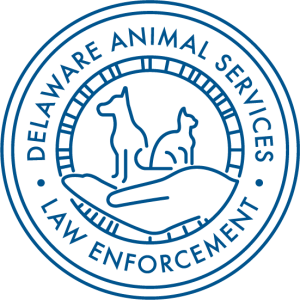MILFORD – Officers from the Delaware Division of Public Health (DPH) Office of Animal Welfare (OAW) arrested a Milford woman on Tuesday July 23, 2019, following the death of a dog that was tethered outside of a home during dangerously hot temperatures. The dog’s owner, 36-year-old Kimberly Sterling, was charged with one count each of cruelty to animals, failure to vaccinate for rabies and failure to obtain a dog license.
The OAW Delaware Animal Services (DAS) unit, which enforces statewide animal control and cruelty laws, responded to a report of a dog tethered outside in the heat on Thursday July 18, 2019. Upon arrival, officers found a dog tethered outside as described. The dog was tangled in the tether, had visible injuries, and appeared to be suffering from heat stroke. Officers were unable to make contact with anyone in the home.
Because the dog was in imminent danger, the officers cut the tether and rushed the dog to medical treatment. The dog died while en route. At that time, two other DAS officers had arrived at the residence where the dog resided and was able to make contact with the owner. During their investigation, officers learned the dog had been tethered outside for several hours. In addition, there was no evidence of shelter, shade, or water present for the dog. While on the property, officers also observed a second dog inside the residence, which was removed for medical evaluation and is being held pending the outcome of the cruelty case.
Sterling was also arraigned on Tuesday, July 23, 2019, and released on her own recognizance pending a court hearing.
OAW once again urges dog owners to protect their animals during excessive heat in the summer months:
• Animals should have access to shade, shelter and water when outside: The best place for pets in hot temperatures is inside the home. If a pet must be outside in the heat, make sure the animal has a shady area and fresh water to help stay cool. The interiors of cat and dog houses can get very hot in summer months. To prevent this, ensure the cat or dog houses have raised floors, a large opening and ventilation, and are placed in the shade.
• Dogs may not be left outside during an excessive heat warning issued by the National Weather Service. In Animal Services, animal cruelty, addition, dogs should never be left unattended outdoors for long periods. If the dog overheats or gets entangled or injured, no one will be there to help.
• Pets should not be left in vehicles, even in mild temperatures: Animals kept inside a vehicle in warm or hot temperatures are susceptible to heatstroke. According to the American Veterinary Medical Association (AVMA), the interior of a vehicle can reach 89 degrees in just 10 minutes when the temperature outside is just 70 degrees. At 80 degrees outside, a vehicle’s interior can reach 99 degrees in that time. Temperatures will continue to rise inside a vehicle, and the AVMA states that cracking windows does little to help. Call 911, or Delaware Animal Services at 302-255-4646 immediately, if you see a pet left unattended in a hot vehicle.
• Practice caution when walking dogs in the heat: The best time of day to walk dogs in summer months is in the early morning or late evening when the sun’s heat is not as intense. A simple touch of the hand to any surface where a walk is planned will tell if it’s too hot for a dog. If it’s too hot for a human hand, it’s too hot for a dog’s paws.
• Pay attention to signs of heat stroke: Just like humans, dogs are susceptible to heat stroke in high temperatures, especially if there is high humidity, increased activity or little ventilation. A dog that is drooling, excessively panting, or unsteady can be showing signs of heat stroke, which can be life-threatening. Seek immediate veterinary attention if your dog has become over-heated and is showing any of these symptoms.
For more information, visit https://animalservices.delaware.gov/ or https://www.avma.org/public/PetCare/Pages/Warm-Weather-Pet-Safety.aspx.
A person who is deaf, hard-of-hearing, deaf-blind or speech-disabled can call the DPH phone number above by using TTY services. Dial 7-1-1 or 800-232-5460 to type your conversation to a relay operator, who reads your conversation to a hearing person at DPH. The relay operator types the hearing person’s spoken words back to the TTY user. To learn more about TTY availability in Delaware, visit http://delawarerelay.com.
The Delaware Department of Health and Social Services is committed to improving the quality of the lives of Delaware’s citizens by promoting health and well-being, fostering self-sufficiency, and protecting vulnerable populations. DPH, a division of DHSS, urges Delawareans to make healthier choices with the 5-2-1 Almost None campaign: eat 5 or more fruits and vegetables each day, have no more than 2 hours of recreational screen time each day (includes TV, computer, gaming), get 1 or more hours of physical activity each day (includes TV, computer, gaming), get 1 or more hours of physical activity each day, and drink almost no sugary beverages.



